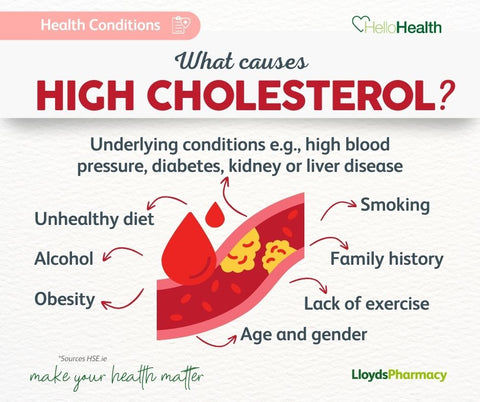Cholesterol

Cholesterol is a fatty substance that plays an important role in our body, but too much of it in the blood can increase the risk of heart disease and other cardiovascular problems. This is a concern in Ireland, where heart disease is a leading cause of death.
Types of Cholesterol
There are two main types of cholesterol:
- Low-density lipoprotein (LDL) cholesterol, also known as "bad" cholesterol, contributes to the build up of plaque in the arteries.
- High-density lipoprotein (HDL) cholesterol, also known as "good" cholesterol, helps remove LDL cholesterol from the arteries.
What does high cholesterol mean?
Cholesterol is made in the body, mainly within the liver, and our body works to maintain it at a healthy level. However, due to overeating of saturated fats and foods or drinks high in fat, sugar, salt, or other things which you have no control over e.g. age and gender, your body can sometimes contain too much cholesterol.
This can cause the cholesterol to stick to your artery walls forming plaque, which can build up causing blockages or narrowing your arteries. Blocked arteries can lead to a heart attack or stroke. Triglycerides are fats carried in our blood which come from the food we eat. High levels are associated with an increased risk of heart attack and strokes.

Managing Cholesterol
To manage cholesterol levels, it's important to make some lifestyle changes, such as:
- Eating a healthy diet rich in fruits, vegetables, and whole grains.
- Exercising regularly.
- Maintaining a healthy weight.
- Quit smoking
- Limiting alcohol consumption.
Medications may also be prescribed to lower cholesterol levels in some cases.
Help and Support
If you're concerned about your cholesterol levels your GP can run a blood test to test your cholesterol levels. Our trained and experienced colleagues across our pharmacies will also be happy to assist with any help and advice you might need on managing your heart health.
Managing cholesterol levels is an important aspect of maintaining heart health. Making lifestyle changes and working with healthcare professionals can help keep cholesterol levels in check and reduce the risk of heart disease. Remember, it's never too late to start making proactive changes for your health.



